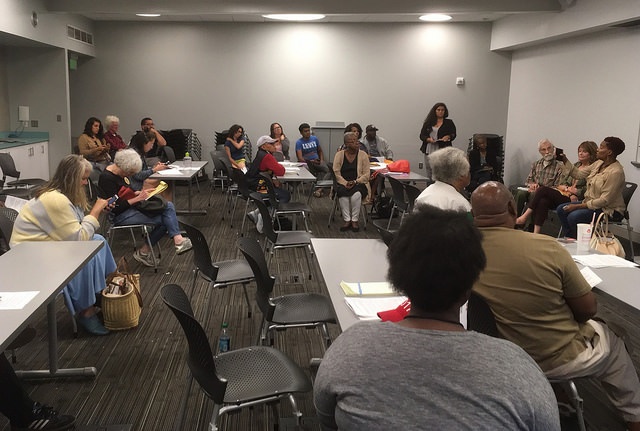The best way for residents to fight to preserve their housing and neighborhood in the face of increasingly aggressive developers is to come out to their neighborhood’s monthly Advisory Neighborhood Commission (ANC) meeting, according to commissioners from several of the District’s ANCs. That’s what the commissioners told people at a Sept. 9 community meeting on the city’s comprehensive plan.
The meeting was organized by the nonprofit Empower DC, which has scheduled similar meetings to be held every month throughout the city until the Comprehensive Plan update is approved by D.C. Council. Empower DC confirmed that 75 people came to the Sept. 9 meeting.
[Read more: D.C. seeks to improve its Comprehensive Plan]
The commissioners who addressed the crowd said developers have gotten increasingly aggressive and are willing to bend or break the city’s zoning rules to build high-cost and dense developments. That forces lower-income D.C. residents to move to far-flung, poorer parts of the city that have fewer community resources.
Many residents in less affluent communities distrust both the developers and the D.C. government agencies that approve new developments. There is a widely held view within less affluent sectors of the District that the city zoning commission, office of planning and department of transportation are aligned with each other against the interests of the little guy, who just wants to stay in his home, where he has often lived for a long time, and which he can afford.
“D.C. has become a cash cow,” Sherice Muhammad, one of Ward 7’s ANC Commissioners, told the riveted crowd gathered in a large basement room at the Anacostia Library on Good Hope Road. “We can look at the developers who have a consistent footprint in this city.”
Muhammad went on, “When you see the same developers, you know who’s calling the shots. When you look at the money trail it tells the picture. Why are developers here in D.C.? Because this is the floodgate, the land of milk and honey for them.”
Muhammad and the other commissioners emphasized that as long as the city administration allows developers to build with impunity, they will. She said that developers often take the position that “I don’t care what the law says, I paid my campaign contribution, and I want my share of the pie.”
Residents were told that they can become influential in the zoning approval process by learning the zoning rules and running for office in one of their ward’s ANCs.
Commissioner Nancy MacWood of Ward 3, a lawyer, has been in that leadership role since 2001. She emphasized there are ways to challenge the zoning approval process. Often, a developer will seek a waiver or “special exception” on a zoning provision. MacWood said that city zoning rules include a concept called “great weight,” which means that the Board of Zoning
Adjustment must take the ANC’s concerns seriously. If citizens in a particular ANC develop a detailed list of common points of contention with a proposed development, the developer’s explanation for why their proposed plan is best for the community must be justified in writing. MacWood told the assembled group that they can go to the D.C. Board of Zoning Adjustment to get a written statement, which she said is a requirement.
MacWood also commented positively about the Bowser administration’s recent program of placing family homeless shelters in every ward, which is a new experience for most neighborhoods.
“Nobody has experience with ward shelters,” she told the crowd. “But it should’ve happened a long time ago, and we welcome them in the community”
All these new gentrified developments are quickly turning D.C. into a high-density city, according to MacWood. The older housing was mostly single-family homes. She asked if any studies had been done to show the impact of higher-density building on the city. “I’m waiting for all these buildings to fall like dominoes,” MacWood said.Long-time public housing advocate and ANC Commissioner Karen Settles,
Long-time public housing advocate and ANC Commissioner Karen Settles, resident of Ward 7, stated, “We’re experiencing government decisions (now) that are made without the people. We’re hindered because information flow is slow.” Settles said she would like to see the city do some job training in parts of the city where there is significant public housing.
Information, she continued, has to flow out of ANC meetings so the public can get it. It will lead to greater community participation. “If people know [a proposed development] affects them, they will come out,” Settles said.








